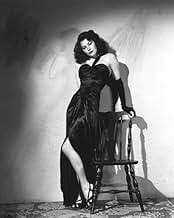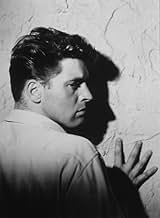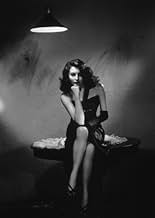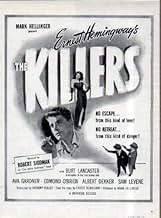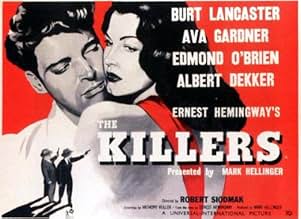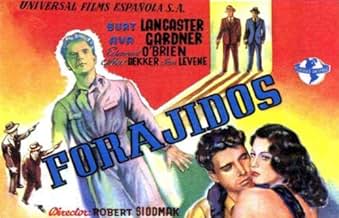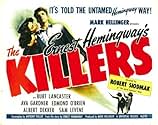Zwei Auftragskiller töten einen widerstandslosen Mann. Der Ermittler Reardon findet heraus, dass das Opfer in der Vergangenheit in die Machenschaften der schönen und tödlichen Kitty Collins ... Alles lesenZwei Auftragskiller töten einen widerstandslosen Mann. Der Ermittler Reardon findet heraus, dass das Opfer in der Vergangenheit in die Machenschaften der schönen und tödlichen Kitty Collins verstrickt war.Zwei Auftragskiller töten einen widerstandslosen Mann. Der Ermittler Reardon findet heraus, dass das Opfer in der Vergangenheit in die Machenschaften der schönen und tödlichen Kitty Collins verstrickt war.
- Für 4 Oscars nominiert
- 4 Gewinne & 4 Nominierungen insgesamt
- Hood with Cane
- (Nicht genannt)
- Assistant Paymaster
- (Nicht genannt)
- Jail Ward Doctor
- (Nicht genannt)
- Fight Spectator
- (Nicht genannt)
- Party Guest
- (Nicht genannt)
Empfohlene Bewertungen
'The Killers' opens with a thrilling prologue that sees two hired thugs (William Conrad and B-noir stalwart Charles McGraw) harass the patrons at a small-town diner on their way to assassinate Swede Andersen. The characters' quickfire exchange of dialogue resembles something that Tarantino or the Coen brothers would have written decades later, only better, because screenwriter Anthony Veiller (with Richard Brooks and John Huston) reproduces the conversation from Hemingway's short story almost verbatim. After Andersen is unresistingly gunned down in his bed, the screenplay then expands upon the foundations laid down by the source material, using flashbacks to fill in the empty spaces at which Hemingway had only hinted. Veiller, whose work before WWII was dominated by romantic dramas, comedies and light mysteries like 'The Ex-Mrs. Bradford (1936),' appears to have been hardened by his work on Frank Capra's "Why We Fight" propaganda series, and the dark, cynical post-War tone he brings to Swede's tragic story is an ideal representation of the noir spirit.
Burt Lancaster shows promise in his screen debut, though the film's narrative structure does keep the audience distant from his character, an issue that Welles somehow avoided in 'Citizen Kane.' As the resident femme fatale, Ava Gardner never quite inspires the collective hatred garnered by Barbara Stanwyck in 'Double Indemnity (1944)' or Jane Greer in 'Out of the Past (1947),' but perhaps that speaks to her charms – that, despite her betrayal, we're still unwilling to treat her with due contempt. Good-guy Edmond O'Brien cheerfully and voyeuristically experiences the wretched life of a gangster through the intermediary flashback device – he ends the film with a cocky grin, like an audience-member emerging from a screening of the latest gangster thriller. Throughout this review, I've been making allusions to 'Citizen Kane,' but there's a very important difference between the two main characters: Charles Foster Kane had all the money in the world and got nothing out of it. Swede Andersen wasn't even that lucky; he didn't even get the money.
Robert Siodmak's classic thriller, along with "Criss Cross" are two of his best pieces of work, proof positive that crime dramas could rise above the mundane and the clichéd.
Based on one of Hemingway's Nick Adams short stories, it tells the intriguing tale of two hit men who show up in a small town (the film moves it from the Midwest to New Jersey), where they take over a diner and tell its terrified occupants they intend to murder a nobody of a gas station attendant when he comes in for dinner. When he doesn't show, they hunt him down at the rooming house where he lives and do the job there. That's where the short story ends, but the script by Anthony Veiller picks it up from there, pursuing the fascinating story of what makes a man give up on life to the point where he passively waits for a pair of gunmen to show up and blow him to smithereens.
The protagonist,called the Swede, is a guy who isn't a criminal by nature, just a guy who fell upon hard times, but sees a way out by committing one more crime. And of course, as in any good film noir, his greed is fueled more by lust than anything else. There's a girl involved and in order to get her, he has to get the loot.
Burt Lancaster, in his first staring role, comes off very well here, as does Ava Gardner, also top billed for the first time. Strong supporting performances by the great Albert Dekker as the top hood and Sam Levine as a cop with a heart of gold. And we cannot forget Charles McGraw and William Conrad as two of the most frightening cold blooded killers in film history.
Siodmak does a great job in the director's chair in this Mark Hellinger (The Roaring Twenties) produced drama, but it is cinematographer Woody Bredell who steals the show. His use of lighting goes beyond spectacular. All of the clichés we think of in film noir lighting spring from this one film, where they were done right. And watch for one of the longest tracking shots in film history, as Nick Adams flees the diner and races to the Swede's rooming house to warn him. It's an amazing, unbroken shot that runs more than a minute.
Watch, too, for the brilliant shoot 'em up scene in a restaurant at the end of the movie when the two gunmen reappear. It is just a textbook blend of all the movies are supposed to be about, great acting, camera movement that means something, and brilliantly layered music by Miklos Rozsa. Film-making doesn't get any better than this.
A four star film and one of the godfathers of the genre. Don't miss this one.
The plot is solid and keeps you guessing until the end, with many twists and turns along the way, and is told asynchronously (perhaps necessary for today's audiences, which may be why it holds up so well). The acting is great, quite realistic, and for the most part avoids the maudlin sentiment and overacting that characterizes some older films.
The Killers is an incredibly enjoyable crime film, perhaps the perfect crime film. I haven't seen the remake, so I can't comment on that, but I hold this film in high regard.
They're there to kill Burt Lancaster, known to the town as just a simple garage mechanic. Because he left a small insurance policy, his death was investigated by insurance cop Edmond O'Brien. Naturally Lancaster was no simple garage mechanic by any means. O'Brien comes up with Burt's real identity and the reason why a few people wanted him dead.
The Killers was a big break film for Burt Lancaster. He had only done one previous film and that was Desert Fury for Paramount studios which had signed him. Because Universal was looking for an unknown to play the victim, Lancaster's agent was able to land him the part. And because Desert Fury was held up, The Killers became his debut film and he was a star from his first film.
This was also a milestone film for Ava Gardner as well. After The Killers, Louis B. Mayer was most reluctant to lend her out any longer due to the notice that she got.
The plot of The Killers is very similar to that of Out of the Past with Lancaster in the luckless Robert Mitchum role. As for Ava Gardner in her portrayal, she's taking a couple of pages from the Mary Astor school of double crossing, two timing dames. At least Mary had Sam Spade's promise he'd wait for her.
The Killers is a must for Burt Lancaster fans who want to see the film that launched his career.
Wusstest du schon
- WissenswertesFilm debut of Burt Lancaster. Although this was his first film--at 33 years of age--he received top billing.
- PatzerIn the jailhouse, Charleston (Vince Barnett) tells The Swede (Burt Lancaster) of his love for the stars. As he looks out the window, he says that he says he sees Orion and a prominent star, Betelgeuse. He says that Orion is the "Great Bear" and that Betelgeuse is the "brightest star in the sky". Orion is actually The Hunter. Ursa Major (containing the Big Dipper) is the Great Bear. Betelgeuse, while quite bright, is the 10th brightest star.
- Zitate
[last lines]
[after Reardon has wrapped up the investigation, Kenyon congratulates him]
R.S. Kenyon: Owing to your splendid efforts the basic rate of The Atlantic Casualty Company - as of 1947 - will probably drop one-tenth of a cent.
[he shakes Reardon's hand]
R.S. Kenyon: Congratulations, Mr. Reardon.
Jim Reardon: I'd rather have a night's sleep.
R.S. Kenyon: Why don't you take a good rest. I must say you've earned it.
[Reardon starts to leave]
R.S. Kenyon: This is Friday... don't come in 'til Monday.
Jim Reardon: Thanks.
- VerbindungenEdited into Tote tragen keine Karos (1982)
- SoundtracksThe More I Know of Love
(1946)
Music by Miklós Rózsa
Lyrics Jack Brooks
Performed by Ava Gardner (uncredited)
Top-Auswahl
Details
- Erscheinungsdatum
- Herkunftsland
- Offizieller Standort
- Sprache
- Auch bekannt als
- Die Killer
- Drehorte
- Produktionsfirmen
- Weitere beteiligte Unternehmen bei IMDbPro anzeigen
Box Office
- Weltweiter Bruttoertrag
- 58.222 $
- Laufzeit
- 1 Std. 43 Min.(103 min)
- Farbe
- Seitenverhältnis
- 1.37 : 1


